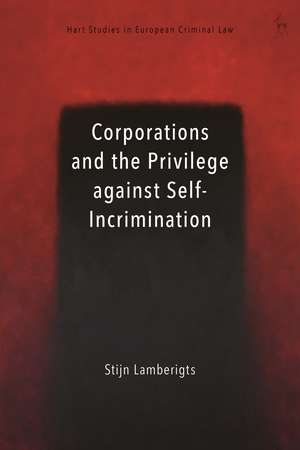Corporations and the Privilege against Self-Incrimination: Hart Studies in European Criminal Law
Autor Dr Stijn Lamberigtsen Limba Engleză Paperback – 3 iul 2024
| Toate formatele și edițiile | Preț | Express |
|---|---|---|
| Paperback (1) | 299.55 lei 6-8 săpt. | |
| Bloomsbury Publishing – 3 iul 2024 | 299.55 lei 6-8 săpt. | |
| Hardback (1) | 512.22 lei 6-8 săpt. | |
| Bloomsbury Publishing – 28 dec 2022 | 512.22 lei 6-8 săpt. |
Din seria Hart Studies in European Criminal Law
-
 Preț: 147.01 lei
Preț: 147.01 lei - 28%
 Preț: 374.46 lei
Preț: 374.46 lei - 22%
 Preț: 264.45 lei
Preț: 264.45 lei -
 Preț: 306.94 lei
Preț: 306.94 lei - 30%
 Preț: 607.18 lei
Preț: 607.18 lei - 30%
 Preț: 567.99 lei
Preț: 567.99 lei - 18%
 Preț: 322.33 lei
Preț: 322.33 lei - 34%
 Preț: 511.97 lei
Preț: 511.97 lei - 18%
 Preț: 322.80 lei
Preț: 322.80 lei - 22%
 Preț: 272.23 lei
Preț: 272.23 lei - 22%
 Preț: 270.57 lei
Preț: 270.57 lei - 18%
 Preț: 322.60 lei
Preț: 322.60 lei - 30%
 Preț: 571.66 lei
Preț: 571.66 lei - 27%
 Preț: 409.90 lei
Preț: 409.90 lei - 30%
 Preț: 835.93 lei
Preț: 835.93 lei - 22%
 Preț: 257.97 lei
Preț: 257.97 lei - 18%
 Preț: 306.94 lei
Preț: 306.94 lei - 18%
 Preț: 308.74 lei
Preț: 308.74 lei - 18%
 Preț: 306.47 lei
Preț: 306.47 lei - 18%
 Preț: 323.84 lei
Preț: 323.84 lei - 22%
 Preț: 273.06 lei
Preț: 273.06 lei - 18%
 Preț: 300.98 lei
Preț: 300.98 lei - 18%
 Preț: 299.01 lei
Preț: 299.01 lei - 28%
 Preț: 466.81 lei
Preț: 466.81 lei
Preț: 299.55 lei
Preț vechi: 365.77 lei
-18% Nou
Puncte Express: 449
Preț estimativ în valută:
57.32€ • 62.46$ • 48.30£
57.32€ • 62.46$ • 48.30£
Carte tipărită la comandă
Livrare economică 23 aprilie-07 mai
Preluare comenzi: 021 569.72.76
Specificații
ISBN-13: 9781509953356
ISBN-10: 1509953353
Pagini: 304
Dimensiuni: 156 x 234 x 25 mm
Greutate: 0.43 kg
Editura: Bloomsbury Publishing
Colecția Hart Publishing
Seria Hart Studies in European Criminal Law
Locul publicării:London, United Kingdom
ISBN-10: 1509953353
Pagini: 304
Dimensiuni: 156 x 234 x 25 mm
Greutate: 0.43 kg
Editura: Bloomsbury Publishing
Colecția Hart Publishing
Seria Hart Studies in European Criminal Law
Locul publicării:London, United Kingdom
Caracteristici
Looks at the increasingly important question of the extent to which the privilege against self-incrimination applies to corporations
Notă biografică
Stijn Lamberigts is an attorney at Eubelius and member of the Brussels Bar, Belgium.
Cuprins
1. Introduction I. Corporate Offenders and Procedural Safeguards II. Corporations, Punitive Cases and the Privilege against Self-Incrimination III. Structure and Methodology 2. The Roots and Historical Rationale(s) of the Privilege against Self-Incrimination I. Nemo Tenetur Prodere Seipsum II. The Oath ex Officio III. Torture IV. Consolidation of the Privilege against Self-Incrimination V. The Missing Piece of the Puzzle? VI. Applying the Historical Rationales to Corporations 3. How Different Are Corporations for the Purpose of the Privilege against Self-Incrimination? I. Corporate Personhood II. (Im)possibility of Exerting Physical or Psychological Pressure on Corporations III. Importance of Documentary Evidence IV. Impossibility of Exercising the Privilege against Self-Incrimination Independently V. Comparable Categories VI. Legitimate Aim VII. Objective Criterion of DistinctionVIII. Suitability and Necessity IX. Proportionality Sensu Stricto 4. Contemporary Rationales of the Privilege against Self-Incrimination I. Protection from Cruel Choices II. The Protection of the Innocent III. The Privilege against Self-Incrimination and the Presumption of Innocence IV. Privacy Protection 5. Self-Incrimination 6. Compulsion I. Compulsion by Public Authorities II. Permitted Compulsion III. Adverse InferencesIV. Private Compulsion 7. The Privilege against Self-Incrimination and Different Types of Evidence I. Oral Statements II. Documentary EvidenceIII. Encrypted Evidence 8. The Applicability of the Privilege against Self-Incrimination Ratione Temporis 9. Waiver of the Privilege against Self-Incrimination 10. Corporations and the Privilege against Self-Incrimination I. (Supra)national Models of Corporate Criminal Liability II. Corporations and the Privilege against Self-Incrimination III. Linking Models of Corporate Criminal Liability to the (Un)availability of a Corporate Privilege against Self-Incrimination IV. The Cooperating Corporation 11. A Proposal for a Balanced Corporate Privilege against Self-Incrimination I. Different Models of a Corporate Privilege against Self-Incrimination II. A Proposal for a Balanced Corporate Privilege against Self-Incrimination 12. Overall Conclusion
